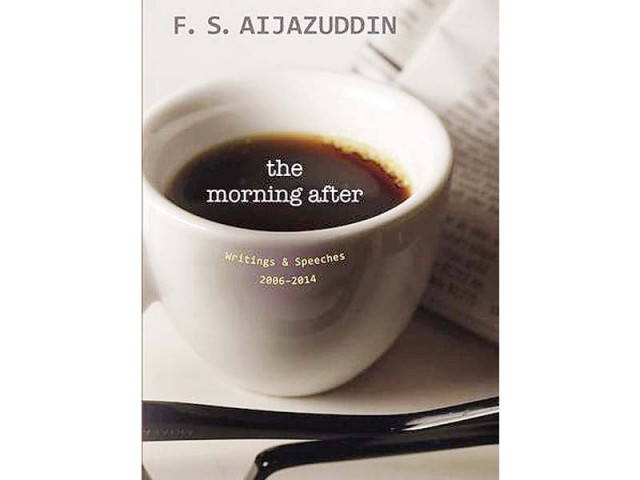Brewing telltales
"The Morning After" is a truly interesting and infinitely easy read

Aijazuddin’s succinct style, beautiful wordplay make ‘The Morning After’ an absorbing read.
F S Aijazuddin has worn many hats. His illustrious career and experience are what make his collection of columns, speeches and reviews, The Morning After, a truly interesting and infinitely easy read.
The book’s simplicity lies in its format. The pieces have been bunched together under different titles.
‘Making Cartoons of Ourselves’ is particularly thought-provoking, wherein he illustrates our country’s reaction to the sacrilegious cartoons in Norwegian newspaper Magazinet. Aijazuddin states we, as Muslims, lack the ability to hold our emotions in check and give such controversies unneccesary attention. He mentions how the West’s perceptions can never be corrected because they will never meet the majority of us, who according to Aijazuddin, are “rational human beings, co-religionists in faith, with a respect and a reverence for life.”
Book review: Sophia - Unlocking the world of Sophia Duleep Singh

The piece on Bushra Bibi who threw her children in front of a train, titled When Death is Preferable, jumped out of the pages and bore a hole in my mind. Her reason: poverty. As Aijazuddin so beautifully states, “For her, the only light at the end of the tunnel was the light of the oncoming train.” He then launches into discussing the government’s inability to obliterate, reduce or even manage poverty. He beautifully concludes this piece by quoting a man who is struggling to make ends meet. “Others [our leaders] boast that we have spread a web of roads across the country. Tell me, sahib, can I feed my children roads?” he quotes.
Two pieces that I felt should be reviewed together are ‘The Winds of Change’ and ‘Storm in a Teacup’. The former moots Nawaz Sharif’s third term as prime minister and the latter is on Narendra Modi’s premiership of India. With true eloquence, Aijazuddin states, “Mr Modi wears half sleeve shirts; Mr Sharif should be not be surprised when Modi keeps nothing up his sleeves.” The article on Modi was of particular interest to me because Aijazuddin gives an overview of his background, imparting quite a bit of knowledge in a pithy manner.
Politics and governance aren’t all this book has to offer. He also traces the rise of Ravi Shankar, from a dancer to sitar-player extraordinaire. “Pandit Ravi Shankar, with the first strum of the strings of his sitar, changed all that. India became synonymous with culture, not cows and agriculture,” he writes.
Fillings gaps with powerful narration
His speech at the Lahore Arts Council, in memoriam of Ismail Gulgee, is also worth a look. He writes about the artist’s rise to fame, the respect he so rightly received and his sad end. “If Gulgee sahib did have an enemy in life, it was time… the other enemy he had was death.” Sends a flutter down your spine, doesn’t it?
From the travel section, one article I particularly enjoyed was ‘Dubai’s Concrete Mirage’. He talks about how Dubai is moving faster than any city before and an interesting analogy he makes is that of the Burj Khalifa and the Biblical Tower of Babel. As he writes, “Will it too, one wonders, become a symbol of man’s hubris, and attract a similar fate?” I couldn’t have said it better.
The highlight of this collection for me was the succinct style, the beautiful wordplay, as well as the literary references and evocations. In short, if you want to nibble on a variety of subjects as well as expand your
knowledge on them, this book is a good read.
The author is a published short story writer and blogger, with a background in advertising. She is a voracious reader and is passionate about travelling. She tweets @sufipanda
Published in The Express Tribune, November 1st, 2015.
Like Life & Style on Facebook, follow @ETLifeandStyle on Twitter for the latest in fashion, gossip and entertainment.



















COMMENTS
Comments are moderated and generally will be posted if they are on-topic and not abusive.
For more information, please see our Comments FAQ